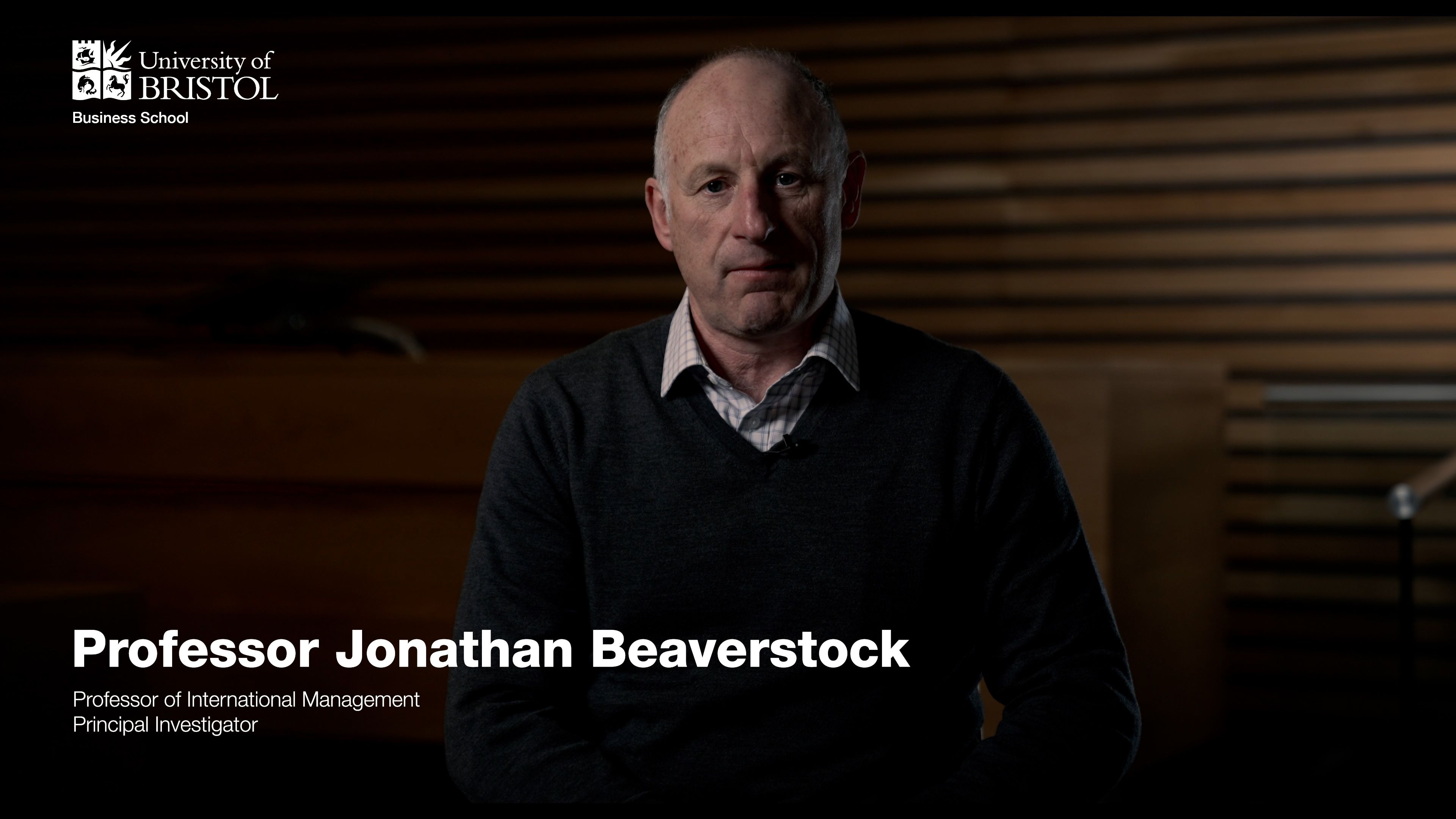Creating a Competitive Advantage for the Bristol and Bath FinTech Cluster Through Growth and Sustainability

What is FinTech?
FinTech is becoming one of the most significant drivers for financial services, for businesses and consumers accessing these in their expenditure and consumption.
“It’s the combination of finance and technology, giving us FinTech and it really is technology and innovation disrupting financial services which is now impacting so much of everyday business and consumption.” - Professor Jonathan Beaverstock
To understand the competitive advantage of the Bristol and Bath FinTech Cluster, we need to learn how going forward those competitive advantages can be enhanced to make the city region a destination for inward investment and talent.
Professor Jonathan Beaverstock, Deputy Dean of the University of Bristol Business School
Professor Jonathan Beaverstock, Deputy Dean of the University of Bristol Business School
Collaboration in the South West
Professor Jonathan Beaverstock, Deputy Dean of the University of Bristol Business School, is an expert in banking, FinTech and financial service clusters. His work with FinTech West, and their Director Stuart Harrison, has helped identify the advantages needed for the growth and sustainability of the Bristol and Bath FinTech ecosystem*. The aim of the collaboration is to share knowledge and to explore what is competitive in the City of London with respect to FinTech and financial services, clustering and how these clustering advantages can be transferred to the Bristol and Bath city region.
*An entrepreneurial ecosystem is defined as, “…a set of interconnected entrepreneurial actors (both potential and existing), entrepreneurial organisations (e.g. firms, venture capitalists, business angels, banks), institutions (universities, public sector agencies, financial bodies) and entrepreneurial processes (e.g. the business birth rate, numbers of high growth firms, levels of ‘blockbuster entrepreneurship’, number of serial entrepreneurs, degree of sell out mentality within firms and levels of entrepreneurial ambition) which formally and informally coalesce to connect, mediate and govern the performance within the local entrepreneurial environment’” (Mason & Brown, 2014).
What is FinTech?
FinTech is becoming one of the most significant drivers for financial services, for businesses and consumers accessing these in their expenditure and consumption.
“It’s the combination of finance and technology, giving us FinTech and it really is technology and innovation disrupting financial services. This impacts so much of our lives and technology from banking, takeaways and AI and continues to evolve as the cluster grows” - Professor Jonathan Beaverstock
To understand the competitive advantage of the Bristol and Bath FinTech Cluster, we need to learn how going forward those competitive advantages can be enhanced to make the city region a destination for inward investment and talent.
Professor Jonathan Beaverstock, Deputy Dean of the University of Bristol Business School
Professor Jonathan Beaverstock, Deputy Dean of the University of Bristol Business School
Collaboration in the South West
Professor Jonathan Beaverstock, Deputy Dean of the University of Bristol Business School, is an expert in banking, FinTech and financial service clusters. His work with FinTech West, and their Director Stuart Harrison, has helped identify the advantages needed for the growth and sustainability of the Bristol and Bath FinTech ecosystem*. The aim of the collaboration is to share knowledge and to explore what is competitive in the City of London with respect to FinTech and financial services, clustering and how these clustering advantages can be transferred to the Bristol and Bath city region.
*An entrepreneurial ecosystem is defined as, “…a set of interconnected entrepreneurial actors (both potential and existing), entrepreneurial organisations (e.g. firms, venture capitalists, business angels, banks), institutions (universities, public sector agencies, financial bodies) and entrepreneurial processes (e.g. the business birth rate, numbers of high growth firms, levels of ‘blockbuster entrepreneurship’, number of serial entrepreneurs, degree of sell out mentality within firms and levels of entrepreneurial ambition) which formally and informally coalesce to connect, mediate and govern the performance within the local entrepreneurial environment’” (Mason & Brown, 2014).
Bristol and Bath as successful emerging Regional FinTech clusters
For places like Bristol and Bath, FinTech has become an important part of the knowledge economy, which refers to its ability to capitalise on scientific discoveries and applied research. This can make a significant contribution to high value job creation and the development and deepening of the city-region's financial services community.
There's rapid growth for FinTech in financial services, business-to-business and consumer-to-business, which has significant impact on UK city regions. Places like Bristol, Edinburgh, Leeds, Manchester and Cardiff are becoming very important regional centres for FinTech outside of London.
This has a positive increase in spending which produces an increase in national income and consumption more than the initial amount spent across regional discoveries and research. From a research perspective, the drivers of the development of successful FinTech clusters – access to finance, innovation, talent and regulation - are critical for the future of FinTech in places like Bristol and Bath with respect to keeping up with knowledge-intensive activities and contributing to economic growth and job creation in high-value jobs.
This research was carried out in collaboration with FinTech West and regional and national stakeholders. It aimed to understand from an industry and academic perspective how FinTech can sustainably grow the Bristol and Bath region’s ecosystem and cluster, where organisations work together to reach a common goal.
The starting point for the research was looking at best practices from the City of London and investigating the different enablers for sustainable FinTech growth and clustering. These include access to capital and finance; talent; and stakeholders, like universities and city councils. The study went on to recommend how these enablers should be mobilised in the local context of Bristol and Bath.
There are many advantages to clustering knowledge sharing, including sharing talent pools, and joining up in relation to geographical proximity. Firms and individuals gain from ‘the sum of the parts,’ to create a cluster dynamic. It's no surprise that the City of London and London’s financial district is a highly successful global financial centre because of the agglomeration economies of firms, talented workforce and transnational communities of practice squeezed in the Square Mile and Canary Wharf to the east.
Professor Beaverstock explains “It’s all about those synergies and sum of the parts with the connections and knowledge flowing through the cluster. Clusters are very porous, they're very dynamic. They receive knowledge and they send knowledge out. If you're a goldfish bowl type cluster, you'll soon wither on the vine because there's not that nourishment of knowledge, change, new ways of thinking and innovation coming through the clusters.”
Bristol has big creative industries, alongside traditional banking, legal accounting, high-value manufacturing and STEM-based industries which create a dynamic, resilient and prosperous economy.
A huge challenge for the future is the fact that the UK and regions like Bristol and Bath are in fierce competition for finance, talent and innovation in FinTech and the allied professional services sector.
Impact of the research
Published in the 2021 ‘Learning from London’s FinTech cluster: Ensuring the future sustainability and competitiveness of the Bristol and Bath FinTech ecosystem’ Final Report recommended that the future sustainability of the city-region as a premier FinTech cluster was dependent on FinTech’s stakeholders and institutions scaling up seven competitive advantages:
(1) Access to national, regional and local funding;
(2) A depth and breadth of talent pool and pipelines;
(3) The establishment of accelerators and incubators;
(4) The economies of scope, depth and distinctiveness of the cluster;
(5) A depth of expertise and ‘institutional thickness’;
(6) Access to an innovative market; and
(7) Global and national connectivity to established FinTech clusters in the U.K., Europe and the rest of the world.
This report was pivotal to the West of England Combined Authority’s 2022 'Bristol and Bath FinTech Cluster Strategy' and has informed other UK regional FinTech clusters of ways to produce ‘strong’ cluster dynamics.
Beyond the realm of regional FinTech, Professor Beaverstock has engaged with the city region’s financial and professional services industry collaborating with organisations such as Burges Salmon. At an international level, his research has informed the City of London Corporation on global talent mobility and cross-border virtual work in financial services; H.M. Home Office Migration Advisory Council on skilled international migration in the City of London; and H.M. Treasury on the competitiveness of the City, cited in the ‘European Monetary Union Study 12: The location of financial activity and the Euro.’
Professor Beaverstock’s work is making an impact on developing the sustainability of the Bristol Bath FinTech cluster, which is becoming a significant international player. The collaboration between Professor Beaverstock and FinTech West continues to address the structural barriers to the development of FinTech in UK regions, looking ahead to the future of FinTech in the UK.
Professor Beaverstock joined FinTech West as a Knowledge Exchange Fellow, funded by the Economic and Social Research Council’s Impact Accelerator Account, bringing social science expertise to the team supporting Bristol, Bath and the Southwest to become a FinTech superpower. He has been involved with the FinTech West advisory board since its inception. He provides thought leadership and leads the ‘Learning from London’ project designed to take lessons from FinTech excellence in the capital to accelerate cluster growth as a centre of excellence in the Southwest.
Continuing to engage with the FinTech community, Professor Beaverstock and the University of Bristol held an in-person FinTech for the Good of Society Knowledge Exchange Workshop in collaboration with FinTech West. This half-day workshop brought together experienced academic and social scientists with FinTech companies, stakeholders, and end-users of such technologies. The key aim of this workshop was to facilitate knowledge exchange between researchers, FinTech companies, and stakeholders to identify future opportunities for coproduction and collaboration on the challenges of FinTech for the good of society. Professor Beaverstock highlighted the importance of collaboration and sharing knowledge within the FinTech community and the roles that the University and researchers played in shaping a better place.
Professor Beaverstock has become an important figure in the national and regional FinTech community, serving on advisory boards and contributing to the development of city-regional FinTech clustering strategies. His research has also influenced other regional FinTech clusters in the UK and has been used by various organisations and government bodies to understand the dynamics of FinTech and financial services clustering. With a specific role that talent mobility plays in making the UK’s financial and professional services industries competitive at the international level.
“We want a community of innovative and sustainable FinTechs to flourish.”
Professor Jonathan Beaverstock
What's next?
Professor Beaverstock led a project team to secure £1.8 million in funding from the UKRI to work on the 'Future Finance For All' accelerator. The aim of this is to harness the power of FinTech to help smaller financial services firms better serve the needs of their existing customers as well as reach new customer bases, whether those are individuals or enterprises. Participating businesses will be in the driving seat to identify the challenges they want help with. These could range from using technology to comply with financial services regulation through to producing innovative products and services that open up new markets.
Professor Beaverstock, leading the project team at Bristol, said: “The accelerator will mobilise social science knowledge and expertise in digital technology to support and enable Small to Medium Enterprises and mid-tier firms to innovate their business models and assist in the delivery of technologically enabled financial services to business and individual customers in markets like payments, lending, savings, pensions and insurance, to become included in the fast-moving financial services, and financial technology, industry."
With the FinTech sector and FinTech education continuing to evolve, we expect to see many future opportunities for expanding the financial clusters in the Bristol and Bath regions and globally, as they continue to grow and accelerate.







